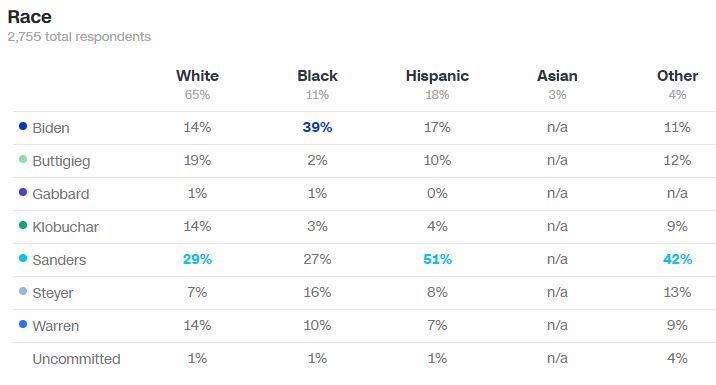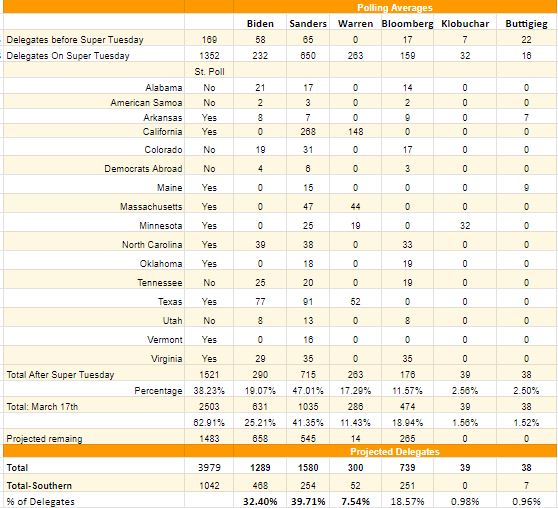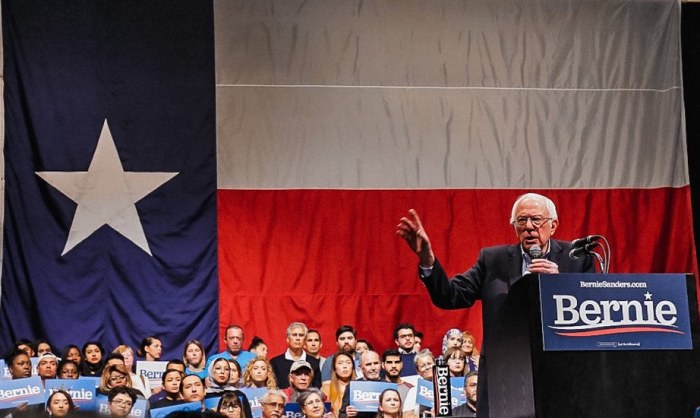Dan Guild spins some scenarios for the Democratic primaries. -promoted by Laura Belin
Mathematically, there is a way to stop Bernie Sanders, but it won’t be easy.
Four years ago I wrote these lines in a post about the Republican presidential race:
In politics we often talk of the narrative. The narrative is not about delegate math, it is about momentum. It asks who is winning and why. It is unforgiving: you either win or you lose. It is difficult to lose and maintain any semblance of energy in a campaign (something seen in Rubio’s implosion) but it also means no more money for future primaries.
In any primary fight, there are times when these two forces are at odds. Such is the case now.
This is precisely the state of the race for the Democratic nomination. It is reasonably easy to create scenarios where Sanders does not get close to a majority of delegates. The problem is primaries are a dynamic process. The difference between winning and losing is stark. Losing drives candidates from the race or makes them irrelevant.
THE LESSONS OF NEVADA
Sanders’ win in Nevada revealed three sources of strength. If these trends continue, his position is stronger than a delegate projection would reflect.
Age: I wrote for CNN that “To understand Sanders’ strength, you must understand that the Democratic Party is really two parties: one for young people and another for the old.” Sanders won 57 percent of those under 45 in Nevada yesterday. The inability of the moderate wing of the party to connect in any meaningful way with those under 45 is not new; a similar divide was apparent in 2008 and 2016. It remains the most significant source of Sanders’ strength, and there is no evidence that any of the remaining candidates can cut into this advantage.
Race: In my last post for this site, I suggested that given the makeup of Super-Tuesday states, the “Sanders lead among Hispanics could rightly be called his own firewall.” Yesterday made clear just how big that firewall is. The numbers in this chart come from the exit poll, and I have read suggestions that they understate Sanders’ margin among Hispanics. Note as well that Sanders is cutting into Joe Biden’s advantage among African Americans.

Medicare for All: No issue has been more hotly contested during the debates that health care. As was the case in Iowa and New Hampshire, more than 60 percent of Democratic voters support single-payer health care reform. Sanders won among those who want Medicare for All by a whopping 33 percent, and Elizabeth Warren was second in this group. From the start, I think moderates have mishandled this issue. They have spent too much time attacking the idea, which is out of step with the party’s rank and file. They would be much better served talking about how they would get people the care they need. Defending the Affordable Care Act or talking about how Medicare for All would throw people off their insurance is simply not an effective message within the party.
DELEGATE MATH
As was the case in 2016 I have been running delegate projects since March of 2019. This is the projection as of this morning. This uses state polling and estimates delegates at both the Congressional district and state level (delegates are awarded by a mix of CD’s and States).

It is not hard to look at these numbers and envision scenarios where Sanders has either a very narrow margin or loses the delegate race. Mike Bloomberg and Biden both are not far from the 15 percent threshold in California, and it would not be a shock to see both net some delegates there.
Equally important are Biden’s and Bloomberg’s numbers in the Deep South on Super Tuesday (five states in the Deep South will vote on March 3). The recent polling from Texas shows a narrow lead for Sanders, and Bloomberg is not far from viability there as well.
In short, is there a way to stop Sanders? Absolutely.
There are, as I see it, three reasons why this projection understates Sanders’ strength:
Warren’s performance in Nevada and her finances may mean she wins far fewer delegates than this projection predicts. As of this moment, I project Warren to win 253 delegates. But in the aftermath of her underperformance in both New Hampshire and Nevada, it’s hard not to question whether my assessment is realistic.
Sanders’ performance on second alignment in Nevada: One thing we saw in Iowa and New Hampshire was evidence of late swings to Amy Klobuchar and Pete Buttigieg. Both outperformed polling, and Buttigieg in particular in Iowa gained support from other moderates on realignment. That did not happen in Nevada. On the contrary, Sanders gained about 7 percent on the second alignment in Nevada. Perhaps talk of a Sanders ceiling is misplaced.
Winning makes you electable. Getting back to my point above, winning early primaries has a profound effect on perceived electability. That has already happened. In the last ABC poll, 11 percent viewed Sanders as the most electable candidate. Winning Nevada will almost certainly strengthen that perception.
Early voting is underway in California, North Carolina, and Texas. At least 20 percent of the vote in California has already been cast. Stopping Sanders is more than possible mathematically. But Nevada will make that much harder. People think in stories. Winning creates one story. Losing creates another. When these stories become accepted, it can be hard to change people’s minds.
Top image: Bernie Sanders speaks to a crowd in El Paso, Texas on February 22 after winning the Nevada caucuses. Taken from the Bernie Sanders campaign Facebook page.




2 Comments
Insidious headline
Your headline makes it sound like stopping Sanders is the goal. That’s a round-about way of excusing a vote for Trump if Sanders is the nominee.
A more neutral headline would have fit this post: “Is it Bernie’s to Lose?” or “Can anyone catch up now?”
iowavoter Mon 24 Feb 11:51 AM
I don't micromanage guest authors
Typically I would only alter a headline for some formatting reason.
If he chose a more provocative headline, that’s his choice. By the way, Dan Guild was a precinct captain for Bernie in 2016. So he’s not part of any anti-Bernie conspiracy.
Laura Belin Mon 24 Feb 5:21 PM